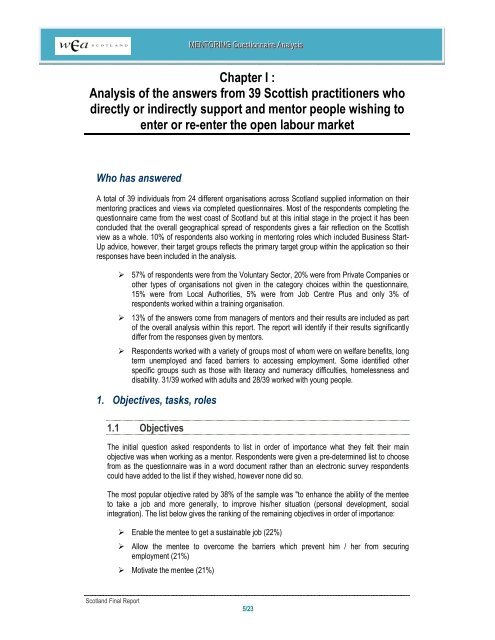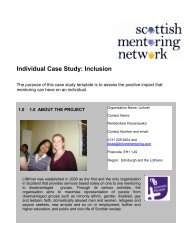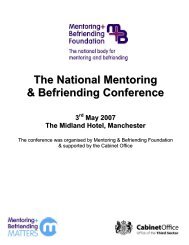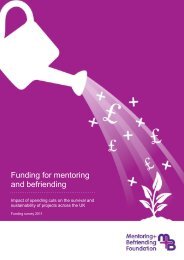MENTORING QUESTIONNAIRE EVALUATION REPORT Answers ...
MENTORING QUESTIONNAIRE EVALUATION REPORT Answers ...
MENTORING QUESTIONNAIRE EVALUATION REPORT Answers ...
You also want an ePaper? Increase the reach of your titles
YUMPU automatically turns print PDFs into web optimized ePapers that Google loves.
MEENNTTORRI IINNG Quueesst tti iioonnnnaai iir ree AAnnaal llyyssi iiss<br />
Chapter I :<br />
Analysis of the answers from 39 Scottish practitioners who<br />
directly or indirectly support and mentor people wishing to<br />
enter or re-enter the open labour market<br />
Who has answered<br />
A total of 39 individuals from 24 different organisations across Scotland supplied information on their<br />
mentoring practices and views via completed questionnaires. Most of the respondents completing the<br />
questionnaire came from the west coast of Scotland but at this initial stage in the project it has been<br />
concluded that the overall geographical spread of respondents gives a fair reflection on the Scottish<br />
view as a whole. 10% of respondents also working in mentoring roles which included Business Start-<br />
Up advice, however, their target groups reflects the primary target group within the application so their<br />
responses have been included in the analysis.<br />
57% of respondents were from the Voluntary Sector, 20% were from Private Companies or<br />
other types of organisations not given in the category choices within the questionnaire,<br />
15% were from Local Authorities, 5% were from Job Centre Plus and only 3% of<br />
respondents worked within a training organisation.<br />
13% of the answers come from managers of mentors and their results are included as part<br />
of the overall analysis within this report. The report will identify if their results significantly<br />
differ from the responses given by mentors.<br />
Respondents worked with a variety of groups most of whom were on welfare benefits, long<br />
term unemployed and faced barriers to accessing employment. Some identified other<br />
specific groups such as those with literacy and numeracy difficulties, homelessness and<br />
disability. 31/39 worked with adults and 28/39 worked with young people.<br />
1. Objectives, tasks, roles<br />
1.1 Objectives<br />
The initial question asked respondents to list in order of importance what they felt their main<br />
objective was when working as a mentor. Respondents were given a pre-determined list to choose<br />
from as the questionnaire was in a word document rather than an electronic survey respondents<br />
could have added to the list if they wished, however none did so.<br />
The most popular objective rated by 38% of the sample was "to enhance the ability of the mentee<br />
to take a job and more generally, to improve his/her situation (personal development, social<br />
integration). The list below gives the ranking of the remaining objectives in order of importance:<br />
Enable the mentee to get a sustainable job (22%)<br />
Allow the mentee to overcome the barriers which prevent him / her from securing<br />
employment (21%)<br />
Motivate the mentee (21%)<br />
Scotland Final Report<br />
5/23






